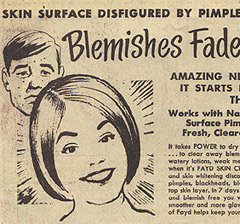Distracted Shoppers Buy More When There's Some Negative Info

(jbcurio)
Established wisdom is that you should only talk about how awesome your product is. But a new study finds that shoppers in distracted settings tend to buy more when products are marketed with a touch of negative info, what is known as “the blemishing effect.”
The forthcoming study in the Journal of Consumer Research, “When Blemishing Leads to Blossoming: The Positive Effect of Negative Information,” by researchers at the Stanford Graduate School of Business and Tel Aviv University went like this, according to Standford GSB News:
…participants were told that the hiking shoes had a number of positive features, including designer orthopedic soles, were waterproof, came with extra shoelaces, and were available in many colors. Other participants got the same information, but were told the shoes only came in two colors, a mild negative. The hiking boots test was conducted online.
Some of the volunteers were distracted by being required to note how many times they looked away from the computer screen (a low-processing condition), while others weren’t — the high-processing condition.
The researchers found that when distracted, participants were more likely to have a favorable opinion of the boots when the description included some negative information along with the positive. But the effect was reversed when the volunteers were not distracted; they were more likely to favor the boots when the information they received was only positive.
So now that both we and marketers know this, you need to be just as skeptical about companies who say a little bit bad about themselves as those who only say good things about themselves.
Could this also mean that the regulator-required disclosure of side effects in drug ads, which are usually delivered via voiceover while the camera moves all over the place and there’s lots of motion and things going in and out of focus, actually increase sales?
The Positive Effect of Negative Information [Stanford GSB News]
Want more consumer news? Visit our parent organization, Consumer Reports, for the latest on scams, recalls, and other consumer issues.

